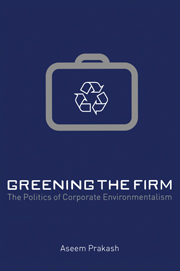Book contents
1 - Greening the firm: an introduction
Published online by Cambridge University Press: 22 September 2009
Summary
Though environmental problems have challenged humankind since time immemorial, policy scientists have given serious attention to environmental issues only since the 1960s. A series of industrial accidents and media events such as the publication of Rachel Carson's Silent Spring (1962) highlighted the environmental consequences of unfettered industrialization. Responding to public concerns, from the 1970s onwards, the United States Congress has enacted a series of laws stipulating environmental standards and technologies for firms. These policies were often backed by zealous monitoring and enforcement. In the 1980s the policy community and the regulatees began articulating their dissatisfaction with the inefficiencies of command and control policies, specifically questioning the capacities of governmental agencies to implement detailed regulations.
Since the late 1980s, particularly after the Rio Summit of 1992, policy-makers appear to have accepted that governmental coercion alone will not be sufficient in forcing firms to adopt environmentally sustainable policies; “right incentives” must be provided (Hahn and Nell 1982; Lee and Misiolek 1986; Baumol and Oates 1988; Oates, Portney, and McGartland 1989; Atkinson and Tietenberg 1991; Tietenberg 1992). More recently, policymakers are beginning to play down their adversarial role, and are highlighting the potential gains of collaborating with firms in developing and implementing environmental policies. Further, as opposed to a reluctance in implementing environmental laws, firms are increasingly inclined to adopt ‘beyond-compliance’ environmental policies, the ones that are more stringent than the requirements of the extant laws and regulations.
Beyond-compliance initiatives could be designed and implemented by regulators, industry associations, or individual firms.
- Type
- Chapter
- Information
- Greening the FirmThe Politics of Corporate Environmentalism, pp. 1 - 15Publisher: Cambridge University PressPrint publication year: 2000



